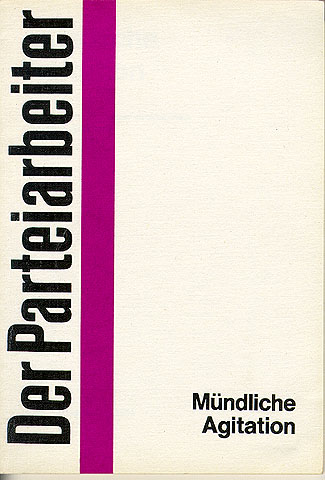


Background: The following is the introduction to a book of reports given at a 1984 conference on the subject of oral agitation. It is one of a larger series of pamphlets titled Der Parteiarbeiter.
The source: Mündliche Agitation. Erfahrungen aus Arbeitskollektiven und Wohngebieten (Berlin: Dietz Verlag, 1984), pp. 3-5.
The following material comes from a conference on oral agitation in work group collectives and housing areas held on 17 May 1984 at the VEB Heavy Machinery Kombinat “Ernst Thälmann” in Magdeburg in preparation for the 35th anniversary of the GDR. The conference was called by the secretariat of the Central Committee of the SED, and drew about 300 comrades, among them party secretaries and agitators from party organizations in industry and farming, secretaries of county offices, department leaders and section leaders in the districts, functionaries from the mass organizations and the government, as well as representatives from organizations of the National Front.
 As
an important and irreplaceable part of political work with the
masses, the open exchange of opinions between our party and citizens
in cities and the countryside, is growing in significance.
As
an important and irreplaceable part of political work with the
masses, the open exchange of opinions between our party and citizens
in cities and the countryside, is growing in significance.
This was stressed in the speech by Comrade Heinz Geggel, member of the Central Committee and head of the Agitation Department of the ZK of the SED, as well as in the discussion, of which the most important parts are printed in this issue of theParteiarbeiter.
Our party sees steady political dialogue as the way to realize the decisions of the X. Party Congress and as essential in maintaining peace and winning the understanding and support of the whole nation in further strengthening the GDR. Socialism today is stronger in Germany than every before. That is proven by the communal elections of 6 May and the National Youth Festival this spring in Berlin as well as by the deeds of the workers in socialist competition in preparation for the 35th anniversary of the GDR.
The trusting relationship between party, state, and people is unshakable. The rightness of our course of the unity of economic and social policy has proven itself. Our workers are successfully meeting the goal of making a strong individual contribution to the guaranteeing of peace and toward making 1984 the most successful year so far in the history of our republic.
A major duty of each communist is to constantly strengthen his relationship to the masses though his deeds, his personal example, and his active political efforts. More than any other method, personal political discussion is suited to learn the questions and opinions of the workers and to get their advice and proposals for solving problems.
Our party has the firm conviction that the experiences of the masses are valuable. Dealing sensitively with people means that we take their opinions and ideas seriously, even as we present them with our arguments and policies. As this conference repeatedly demonstrated, when we use personal political discussions to organize the work of citizens, the result is initiative and action, and we achieve our best results.
Our political work with the masses in the work collectives of factories and Kombinats is determined by the new economic strategy and is aimed at improving the process of intensification, building stable foundations for its development in the future and introducing new technologies and products in our economy.
Each comrade is obligated to take a clear political position from a firm party stance, and to demonstrate it daily. The slogan is truer here than anywhere else: Where there is a party member, there too is the party! The party organization therefore has the task of effectively organizing and leading agitators in the work collectives and thereby the whole of oral agitation.
To develop a healthy political climate in a work collective, the group organizer, the representative, and the government leader must work together. How they understand the organization of unified economic and political-ideological processes has a certain influence on the economic results and the political atmosphere in any work collective.
Comparing accomplishments has growing important in encouraging workers to increase their creativity and productivity, as does the wide use of the experiences of the best workers in fully using our economic resources.
Experience shows that in housing areas, mass political work is most effective when it succeeds in connecting the questions that occupy citizens close to home with the larger questions of domestic and international politics. That requires in particular wide-ranging political work with the masses on the part of local governmental functionaries, particularly the mayor, and regular work with the organizations of the National Front.
Oral agitation, as experience continually shows, is a particular responsibility of local party organizations in organizing broad, differentiated and effective work with the masses. Effective internal party activity is critical here. It is essential that comrades receive solid information and arguments in membership meetings, party education and all other aspects of party life. They must also read the party’s press every day to become familiar with the policies of the party, enabling them always to proceed from a firm class position and to react quickly and responsibly with the necessary arguments.
The plan for political work with the masses provides the local, county and district organizations with an effective way to guide oral agitation and to gain a regular overview of the effectiveness of their work.
Page copyright © 1998 by Randall L. Bytwerk. No unauthorized reproduction. My e-mail address is available on the FAQ page.
Go to the German Propaganda Archive Home Page.